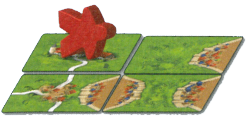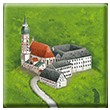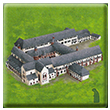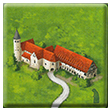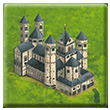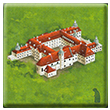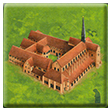Monasteries
General info and comments
Originally released by Hans im Glück in 2018 during Essen Spiel.
With his mini expansion, containing six well-known German monasteries, you'll have the possibility to score your monasteries in a renewed way. However, you'll only know at the end of the game whether you've made a profitable decision.
Contents
- 6 new Land tiles showing existing monasteries in Germany.
Rules
Although the Meeple can be used as an abbot in this expansion, this should not be confused with the Abbot meeple from The Abbot expansion
Preparation
Remove the “original” monastery tiles from the base game and return them to the box. Mix the six new Monastery tiles in with the rest of the game tiles.
1. Placing a tile
The tiles of this expansion are placed following the basic rules of Carcassonne.
2. Placing a meeple
If a player draws one of the German Monastery tiles, he places it according to the normal rules. He then has two options when deploying a follower on the monastery:
- As a Monk: In this option, the monastery is treated like a monastery in the base game, and all the normal scoring rules remain the same; or
- As an Abbot: In this option, the follower is considered an abbot of the monastery. To emphasize this, the player stands the follower on its side to signify that the monastery will be scored differently than a cloister. The monastery scores only at the end of the game.
These two options are available whenever a follower would be placed on the cloister: initial tile placement, wagon movement, magic portal, flier, etc.
3a. Scoring a monk
A follower placed on a Monastery as a monk follows the regular scoring rules of Carcassonne.
3b. Final scoring of an abbot
An abbot on a monastery is not scored until the end of the game. For his abbot, the player receives 1 point per tile present in the vertical column and horizontal row outward from the monastery. The monastery tile itself also scores 1 point. Any empty spaces in the monastery’s row or column interrupt the series of tiles that score for the monastery.
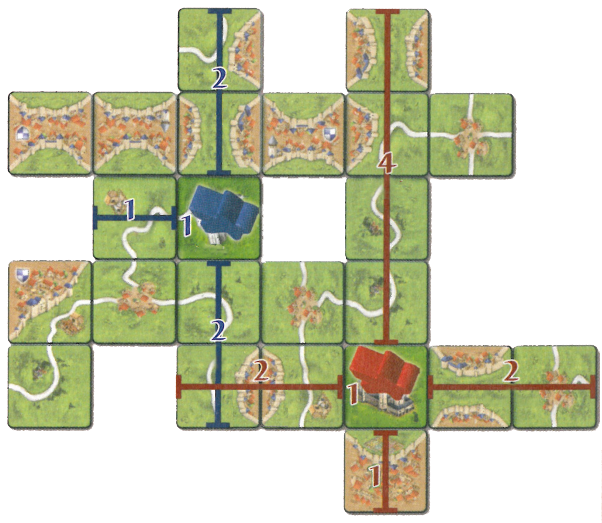
Interactions with other expansions
 The Flying Machines
The Flying Machines
If a second follower is placed on the special Monastery through use of the The Flying Machines, the player can choose to make the new follower either a monk or an abbot, regardless of the identity of the first follower there. However, if the special Monastery is already surrounded by 8 tiles, thus representing a completed cloister, the second follower must be an abbot.
 The Hills and Sheeps
The Hills and Sheeps
When using special Monasteries, the vineyard bonus is applied to the special Monastery if the follower is placed as a monk and the feature is scored as a finished cloister. However, the vineyard bonus is not applied if a follower is placed as an abbot on a Monastery, as the abbot scores only at the end of the game, when the vineyard has no effect.
Tile distribution
Total Tiles: 6
The Monasteries in detail
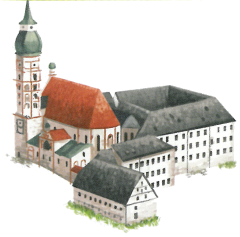 |
Andechs Monastery (Bayern) On the eastern shore of Lake Ammersee, Andechs Monastery, the oldest pilgrimage site in Bavaria, is located. It was founded in 1455 as a branch office of the Benedictine monks. The monastery is also known far beyond the borders of Bavaria for its beer. www.andechs.de |
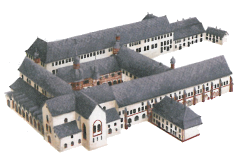 |
Eberbach Monastery (Hessen) The Eberbach Monastery is a former Cistercian abbey near Eltville. The monastery was founded in the 12th century, and with its Romanesque and early Gothic features, is one of the most important monuments in Europe. It gained worldwide fame as a filming location for the film adaptation of the novel "The Name of the Rose" by Umberto Eco. www.kloster-eberbach.de |
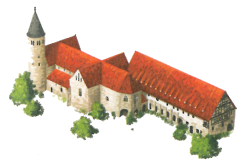 |
Lorch Monastery (Baden-Württemberg) Lorch, a former Benedictine monastery, is situated on a mountain ridge above the Rems valley, and is visible from far away. It was donated in 1102 by Duke Frederick I of Swabia and his family. The heyday of the Benedictine monastery was during the late Middle Ages. Even today, the charming monastery, complete with church, retreat, farm buildings and a garden, surrounded by a circular wall, is still completely intact, and attracts many visitors. |
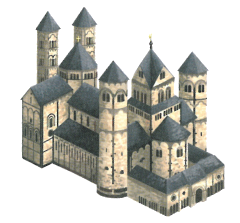 |
Maria Laach Monastery (Eifel/Rheinland-Pfalz) Founded in 1093 the Maria Laach is a high medieval monastery, located on the southwest side of Laacher Lake. A landmark of this Benedictine monastery is the 6-towered monastery church, the Laacher Munster. |
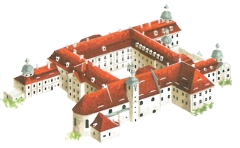 |
Marienthal Monastery (Sachsen) The monastery of St. Marienthal is the oldest convent of the Cistercian Order in Germany. It has continuously been in operation from its founding in 1234 until today. It is situated near Görlitz, on the border triangle of Germany, Poland and the Czech Republic. www.kloster-marienthal.de |
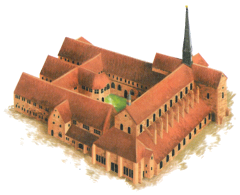 |
Maulbronn Monastery (Baden-Württemberg) The Maulbronn Monastery, a former Cistercian abbey which is now recognized as a World Heritage Site, is considered to be the most well-preserved medieval monastery north of the Alps. Founded in the 12th century, all styles and levels of development of the Romanesque period through the late Gothic period are represented here. www.kloster-maulbronn.de |

